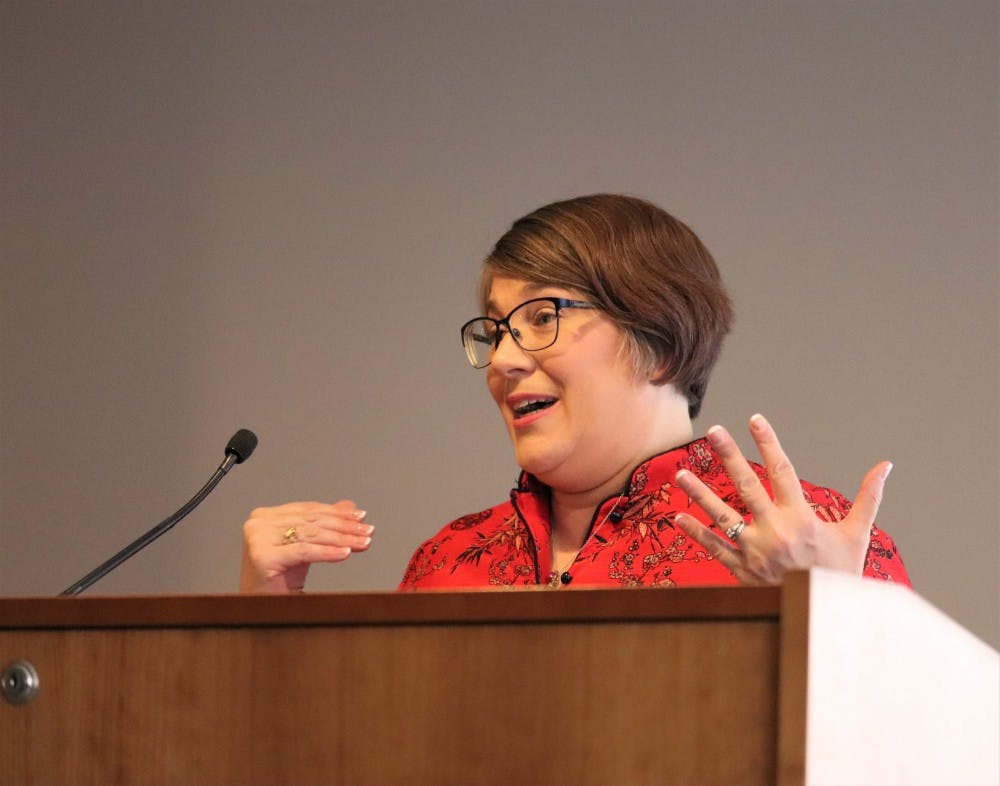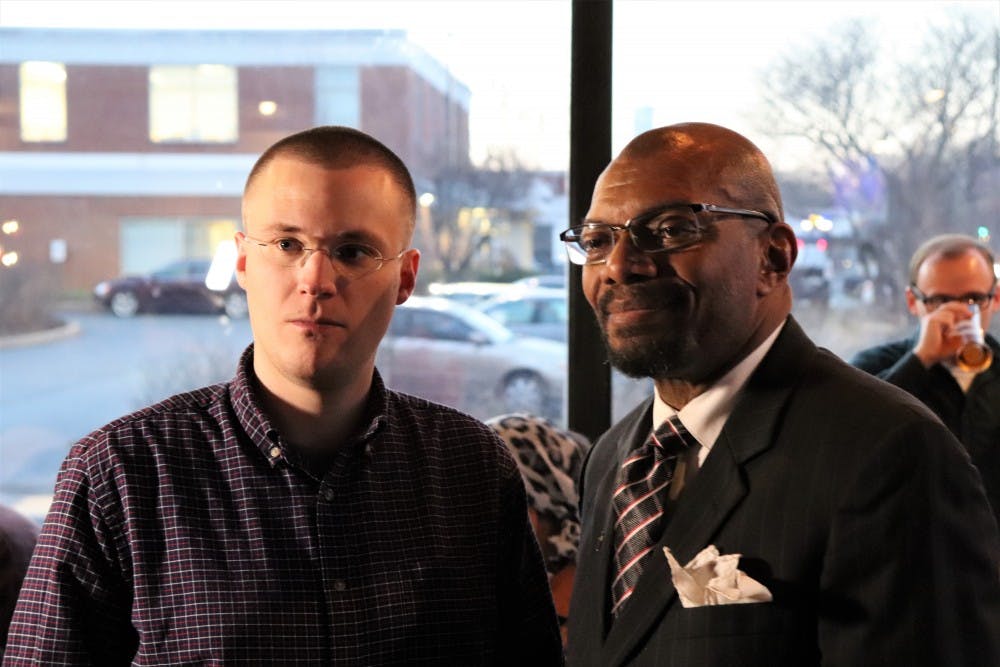Four individuals have already formally declared their candidacies as Democratic contenders for the Charlottesville City Council, including local activist and community organizer Michael Payne, Region Ten board member Sena Magill, local criminal defense attorney Lloyd Snook and Brian Pinkston — a project manager at the University.
Payne has served as a community organizer for Habitat Virginia and volunteers with the Charlottesville Low-Income Housing Coalition. He also co-founded Indivisible Charlottesville in 2017 — a political advocacy organization focused on progressive policy reform — and has served as an organizer with the Charlottesville chapter of the Democratic Socialists of America. Payne makes frequent appearances before the City Council to speak in favor of a variety of progressive policy issues, especially affordable housing.
Magill is a longtime Charlottesville native, having lived in the City since she was 18 years old. She attended Piedmont Virginia Community College and earned a degree in psychology from the University of Virginia in 2001. From 1999 to 2010, she served as the director of Intensive Services for Region Ten — a local and regional governmental agency which serves to provide assistance and services to those with mental illnesses or disabilities.
Sena Magill’s husband, Tyler Magill — who was an employee with the U.Va. Library System at the time — suffered a stroke Aug. 11, 2017 due to injuries believed to have been sustained as a result of an altercation with white supremacist demonstrators who led a torch-lit march across Grounds to the Thomas Jefferson statue at the Rotunda and clashed with student counter protesters. In an interview with The Cavalier Daily, Sena said Tyler was at the Rotunda that night to ensure the students’ safety.
Magill added that her husband’s injury and the trauma inflicted upon the Charlottesville community after August 2017 were factors in her decision to run for Council.
“That’s given me some of the energy to do this,” she said. “I had been thinking about it for a number of years, there were a number of factors that just kind of pulled together at once, and I want to try to be part of the solution.”
Snook announced his candidacy in a Facebook post last Thursday, writing that his campaign will have three central goals: restoring order in Charlottesville’s government, confronting the challenges of a growing city — including rapid population increase and urban development — and addressing issues that contribute to increased incarceration rates, such as affordable housing. Snook kicked off his candidacy at Bashir’s Taverna Tuesday. Pinkston is expected to do so by early February.
Local design engineer John Edward Hall has also announced his plans to run for a seat on the Council as an independent candidate. Hall also ran in the 2017 City Council elections as an independent candidate — with an emphasis on road and transportation improvements — finishing in fifth place with 600 votes. In what will be his fourth run for a seat on Council, Paul Long also announced his candidacy Monday as an independent candidate, focusing on issues of public transportation and local government accountability.
Don Gathers, a co-founder of the Charlottesville chapter of Black Lives Matter and a deacon at First Baptist Church, initially planned to announce his candidacy for Council as a Democrat alongside Payne but decided to delay the formal start of his campaign, citing health concerns related to a heart attack he suffered this past October.
Gathers served as co-chair of the Charlottesville Blue Ribbon Commission on Race, Memorials, and Public Spaces and was a member of the City’s recently-established Police Civilian Review Board until he resigned Jan. 8 due to health concerns. Gathers has also consistently stood before the Council in recent years and has been active in the community to advocate for a host of issues from affordable housing to law enforcement accountability. He has also strongly condemned the City’s flawed response to the August 2017 Unite the Right rally, as documented in a critical report led by Tim Heaphy, a former U.S. attorney and current University Counsel.
“I just found out several hours ago … that there’s still some issues that need to be addressed, and because of those issues I’m under the advisement that I need to delay the announcement of the start of my campaign — not suspend, not forego, but delay,” Gathers said to supporters at his and Payne’s campaign launch Jan. 8. “I’m not going away, I just need to refocus and rededicate and take care of the temple that the Lord blessed me with.”
During their campaign launch party Jan. 8 at Kardinal Hall in Charlottesville, Payne and Gathers laid out their platform and vision for the upcoming election — focusing on the issues of affordable housing, climate change and racial equality under the slogan “Community Driven, Community Focused.”
“Our community is at a crossroads — Charlottesville is rapidly changing, we’re seeing a lot of change, a lot of growth, and with that can come a significant amount of problems,” Payne said. “It’s also a moment of tremendous hope and tremendous potential for our city because for as much trauma and pain there have been over the past few years, there's been a tremendous progressive movement which has transformed politics in Charlottesville and central Virginia.”
A housing needs assessment commissioned by the City in early 2017 detailing the scope of housing needs in the city found that 1,750 households spend more than half of their income on housing. The report also concluded that the City will require 4,000 affordable units in the coming decades.
Payne said there is a broader need to acknowledge and embrace the many benefits of increasing affordable housing opportunities and building public housing. In particular, he said new construction of such housing options and increased availability of affordable housing can drive economic growth for working class families.
“I think we have the potential to become a statewide model for how local communities can come together and unify around creating affordable housing,” Payne said. “We can do something unprecedented by expanding it and having public housing be a crown jewel of our city and send a signal that working families can afford to live in this city, and we want to provide affordable housing as a human right.”
In an interview with The Cavalier Daily, Payne said he believed his and Gather’s vision would appeal to a broad range of voters due to its emphasis on helping working class residents in Charlottesville and holding local government accountable.
“At the end of the day, it’s the work that you guys do that drives change,” Payne said to supporters at the campaign launch. “This campaign is not about me, it’s not about Don, [and] it’s not about any one person — it’s about the community.”
After Gathers announced the delay of his campaign, he briefly explained his motivation for running, citing ongoing but increasingly visible racial disparities in Charlottesville — including unaffordable housing and racial achievement gaps in local schools — after the white supremacist Unite the Right rally in August 2017.
“We’ve got a lot of work that needs to be done,” Gathers said. “There’s still a very high level of toxicity in this city that existed well before [August 11 and 12] of 2017. That just pulled the covers back, that just unearthed it, that just revealed exactly what many of the problems were that existed in the city that no one ever wanted to lay their hands on.”
“Now we've been forced to have to deal with them and look them in the eye and try to understand exactly what we need to do moving forward,” Gathers added.
During her campaign announcement at City Space Jan. 9, Magill focused on the issues of housing, affordable living and mental health.
“I'm not doing this because I want to get something out of it,” Magill said. “I'm doing this because I really want to give back to the community that I grew up in, to the to the community my daughter's growing up in.”

Sena Magill addresses supporters at her campaign announcement event Jan. 9.
With regards to affordable housing, Magill said her experience with mental health while working at Region Ten was closely related to the issue, arguing that adequate housing and food supply are prerequisites for achieving any subsequent development.
“Nobody, especially who has a serious mental health issue, has any chance of addressing how to live with their serious mental health issue in a way that isn't terrorizing them at different times without first having the safety and security of housing and food,” Magill said. “Once that's met, then we can begin working.”
Three seats on the City Council are up for grabs in 2019 — those currently held by Democratic councilors Kathy Galvin, Mike Signer and Wes Bellamy. Galvin, owner of Galvin Architects since 1993, was first elected to the Council in 2011. Signer, a local attorney, has held a seat on the Council since 2016 and served as mayor until 2018. Bellamy, a local educator and community organizer, was first elected to the Council in 2015 and served as vice mayor until January 2018.
Galvin, Bellamy and Signer have yet to publicly announce if they will seek reelection to the Council this November. If one or more of the current councilors do decide to run for reelection as Democratic candidates, they would have to first face off against the already-declared candidates during the June 11 Democratic primary in which the top three candidates will proceed to the general election ballot.
According to the Virginia Public Access Project, there are currently no active fundraising committees in place for either Signer or Galvin. However, VPAP data shows that the Bellamy for Charlottesville City Council committee is still active and had an ending balance of $120 as of Dec. 31, 2018.
VPAP data also shows that Magill, Snook and Pinkston have established campaign committees — Pinkston and Snook have yet to file any reports with the State Board of Elections, while Magill’s campaign had an ending balance of $11,723 as of Dec. 31, 2018. Payne and Gathers are being funded by the recently-established Progressives for Cville political action committee, which had an ending balance of $595 as of Dec. 31, 2018.
Jalane Schmidt, an associate professor of religious studies at the University and a local activist, serves as the political director for the Progressives for Cville PAC which “supports candidates for City Council who embrace a robust, progressive solution for our City’s many challenges that we’ve identified,” Schmidt said at Payne’s launch event.
Schmidt added that the PAC was formed not long after the one-year anniversary of the deadly Unite the Right rally in Charlottesville with the aim of addressing long-standing issues — such as persistent racial and economic inequality — which she said the “Summer of Hate” brought to the forefront for many city residents.
The most recent City Council elections took place in November 2017 in which Nikuyah Walker — the first African-American woman to be elected mayor by the Council and the first independent councilor since the 1940s — and Democrat Heather Hill won the most and second most votes, respectively. Walker and Hill filled the seats of former Democratic Councilors Bob Fenwick and Kristin Szakos.







